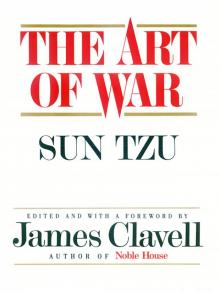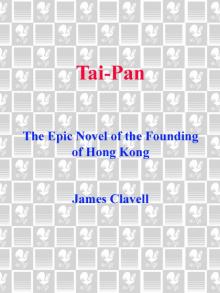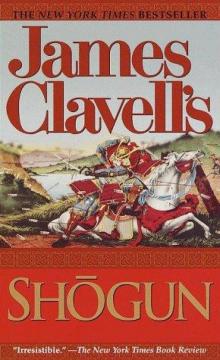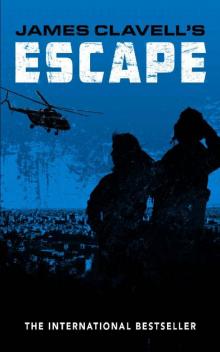- Home
- James Clavell
Gai-Jin Page 7
Gai-Jin Read online
Page 7
“You mean she’d kill you afterwards?”
“Yes, if I pillowed her, with or without force, that woman would kill me.” Ori waved the air, the insects becoming a pestilence. “I’ve never seen one like her—nor have you. You noticed too, neh?”
“No, everything happened so fast and I was trying to kill the big ugly one with the pistol and then she had fled.”
Ori stared at the faint lights of Yokohama. “I wonder what she’s called, what she did when she got back there. I’ve never seen—she was so ugly and yet …”
Shorin was unsettled. Normally Ori hardly noticed women, just used them when he had a need, let them entertain him, serve him. Apart from his adored sister, he could not remember Ori ever discussing one before. “Karma.”
“Yes, karma.” Ori shifted his bandage to be more comfortable, but the throbbing deepened. Blood seeped from under it. “Even so, I do not know if we lost. We must wait, we must be patient and see what will happen. We always planned to go against gai-jin at the first opportunity—I was right to go against them at that moment.”
Shorin got up. “I’m tired of seriousness, and kami and death. We’ll know death soon enough. The Sensei gave us life for sonno-joi. From nothing into nothing—but tonight we’ve another night to enjoy. A bath, saké, food, then a real Lady of the Night, succulent and sweet-smelling and moist …” He laughed softly. “A flower, not an orchid, with a beautiful nose and proper eyes. Let’s—”
He stopped. Eastwards, from the direction of Yokohama, came the echoing report of a ship’s signal cannon. Then a signal rocket briefly lit the darkness.
“Is that usual?”
“I don’t know.” Ahead they could just see the lamps at the first barrier. “Through the paddy is better, then we can skirt the guards.”
“Yes. Better we cross the road here and go closer to the shore. They won’t expect intruders that way, we can avoid any patrols, and the Inn is nearer.”
They ran across the road, keeping well down, then up onto one of the paths that transversed the fields recently planted with winter rice. Suddenly they stopped. From the Tokaidō came the clatter of approaching horses and jingling harness. They ducked down, waited a moment, then gasped. Ten uniformed dragoons, armed with carbines and led by an officer, cantered out of the curve.
At once the soldiers were spotted by samurai at the barrier, who called out a warning. Others rushed from the huts to join them. Soon there were twenty lined up behind the barrier, an officer at their head.
“What shall we do, Ori?” Shorin whispered.
“Wait.”
As they watched the senior samurai held up his hand. “Stop!” he called out, then nodded slightly instead of a bow, correct etiquette from a superior to an inferior. “Is your night travel authorized? If so please give me the papers.”
Ori’s fury soared as he saw the open insolence of the gai-jin officer who halted about ten paces from the barrier, called out something in his strange language and imperiously motioned to the samurai to open it, neither dismounting nor bowing courteously as custom demanded.
“How dare you be so rude! Leave!” the samurai said angrily, not expecting the insult, waving them away.
The gai-jin officer barked an order. At once his men unslung their carbines, levelled them at the samurai, then on an abrupt second order, fired a disciplined volley into the air. At once they reloaded and aimed directly at the guards, almost before the sound of the volley had died away, leaving a vast ominous silence throughout the landscape.
Shorin and Ori gasped. For all time guns had been muzzle-loaded with powder and shot. “Those are breech-loading rifles, with the new cartridges,” Shorin whispered excitedly. Neither had ever seen these recent inventions, had only heard of them. The samurai were equally shocked. “Eeee, did you notice how fast they reloaded? I heard a soldier can easily fire ten rounds to one of a muzzle loader.”
“But did you see their discipline, Shorin, and that of the horses? They hardly moved!”
Once more the gai-jin officer haughtily motioned them to open the barrier, no mistaking the threat that if he was not obeyed quickly, all the samurai were dead.
“Let them through,” the senior samurai said.
The Dragoon officer disdainfully spurred forward, apparently without fear, his grim-faced men following, their guns ready. None of them acknowledged the guards or returned their polite bows.
“This will be reported at once and an apology demanded!” the samurai said, enraged with their insulting behavior, trying not to show it.
Once they had passed through, the barrier was replaced and Ori whispered furiously, “What foul manners! But against those guns what could he do?”
“He should have charged and killed them before he died. I could not do what that coward did—I would have charged and died,” Shorin said, knees trembling with anger.
“Yes. I think …” Ori stopped, his own anger evaporating at his sudden thought. “Come on,” he whispered urgently. “We’ll find out where they’re going—perhaps we can steal some of those guns.”
CHAPTER FOUR
The royal Naval longboat came out of the twilight and sped for the Kanagawa jetty. It was strongly built of stone and wood, unlike the others that speckled the shore, and boldly signposted in English and Japanese script: Property of H.M. British Legation, Kanagawa—trespassers will be prosecuted. The longboat was rowed briskly by sailors and crammed with armed marines. A thin band of scarlet still rimmed the western horizon. The sea was choppy, the moon rising nicely with a fair wind jostling the clouds.
One of the Legation Grenadiers waited at the end of the wharf. Beside him was a round-faced Chinese wearing a long, high-necked gown, and carrying an oil lamp on a pole.
“Oars ho!” the Bosun ordered. At once all oars were shipped, the bowman leaped onto the wharf and tied the boat to a bollard, marines followed rapidly in disciplined order and formed up defensively, guns ready, their Sergeant studying the terrain. In the stern was a naval officer. And Angelique Richaud. He helped her ashore.
“’Evening, sir, Ma’am,” the Grenadier said, saluting the officer. “This here’s Lun, he’s a Legation assistant.”
Lun gawked at the girl. “Ev’nin, sah, you cumalong plenty quick quick, heya? Missy cumalong never mind.”
Angelique was nervous and anxious and wore a bonnet and a blue silk hooped dress with a shawl to match that set off her paleness and fair hair to perfection. “Mr. Struan, how is he?”
The soldier said kindly, “Don’t know, Ma’am, Miss. Doc Babcott, he’s the best in these waters, so the poor man will be all right if it’s God’s will. He’ll be proper pleased to see you—been asking for you. We didn’t expect you till morning.”
“And Mr. Tyrer?”
“He’s fine, Miss, just a flesh wound. We best be going.”
“How far is it?”
Lun said irritably, “Ayeeyah, no far chop chop never mind.” He lifted the lamp and set off into the night, muttering busily in Cantonese.
Insolent bastard, the officer thought. He was tall, Lieutenant R.N., his name John Marlowe. They began to follow. At once the marines moved into a protective screen, scouts ahead. “Are you all right, Miss Angelique?” he asked.
“Yes, thank you.” She pulled the shawl closer around her shoulders, picking her way carefully. “What an awful smell!”
“’Fraid it’s the manure they use for fertilizers, that and low tide.” Marlowe was twenty-eight, sandy-haired and grey-blue-eyed, normally Captain of H.M.S. Pearl, a 21-gun steam-driven frigate, but now acting Flag Lieutenant to the ranking naval officer, Admiral Ketterer. “Would you like a litter?”
“Thank you, no, I’m fine.”
Lun was ahead slightly, lighting their way through the narrow, empty village streets. Most of Kanagawa was silent, though occasionally they could hear boisterous and drunken laughter of men and women behind high walls that were pierced from time to time by small barred doorways. A multitude of decorative Jap
anese signs.
“These are Inns, hotels?” she asked.
“I would imagine so,” Marlowe said delicately.
Lun chuckled quietly, hearing this exchange. His English was fluent-learned in a missionary school in Hong Kong. On instructions he carefully hid the fact and always used pidgin and pretended to be stupid so he knew many secrets that had great value to him, and to his tong superiors, and to their leader, Illustrious Chen, Gordon Chen, compradore of Struan’s. A compradore, usually a wellborn Eurasian, was the indispensable go-between betwixt European and Chinese traders, who could speak fluent English and Chinese dialects, and to whose hands at least ten percent of all transactions stuck.
Ah, haughty young Missy who feeds on unrequited lust, Lun thought with vast amusement, knowing lots about her. I wonder which of these smelly Round Eyes will be the first to spread you wide and enter your equally smelly Jade Gate? Are you as untouched as you pretend, or has the grandson of Green-eyed Devil Struan already enjoyed the Clouds and the Rain? By all gods great and small, I shall know soon enough because your maid is my sister’s third cousin’s daughter. I already know your short hairs need plucking, are as fair as your hair and much too abundant to please a civilized person but I suppose all right for a barbarian. Ugh!
Ayeeyah, but life is interesting. I’ll wager this murder attack will cause both foreign devils and the Filth Eaters of these islands much trouble. Wonderful! May they all drown in their own feces!
Interesting that the grandson of Green-eyed Devil was wounded badly, and so continues the bad joss of all males of his line, interesting that the news is already rushing secretly to Hong Kong by our fastest courier. How wise I am! But then I am a person of the Middle Kingdom and of course superior.
But a bad wind for one is good for another. This news will surely depress the share price of the Noble House mightily. With advanced information I and my friends will make a great profit. By all the gods, I will put ten percent of my profit on the next horse at Happy Valley races with the number fourteen, today’s date by barbarian counting.
“Ho!” he called out, pointing. The central turrets of the temple loomed over the alleys and lanes of the tiny single-story houses, all separate though clustered in honeycombs.
Two Grenadiers and their Sergeant were on guard at the temple gates, well lit with oil lamps, Babcott beside them. “Hello, Marlowe,” he said with a smile. “This is an unexpected pleasure. Evening, Mademoiselle. What’s—”
“Pardon, Doctor,” Angelique interrupted, peering up at him, astounded at his size, “but Malcolm, Mr. Struan, we heard he was badly wounded.”
“He has had quite a bad sword cut, but he’s been sewn up and now he’s fast asleep,” Babcott said easily. “I gave him a sedative. I’ll take you to him in a second. What’s up, Marlowe, why—”
“And Phillip Tyrer?” she interrupted again. “Is he, was he badly wounded too?”
“Just a flesh wound, Mademoiselle, there’s nothing you can do at the moment, both are sedated. Why the marines, Marlowe?”
“The Admiral thought you’d better have some extra protection—in case of an evacuation.”
Babcott whistled. “It’s that serious?”
“There’s a meeting going on right now. The Admiral, the General, Sir William together with the French, German, Russian and American representatives and the, er, the trading fraternity.” Marlowe added dryly, “I gather it’s rather heated.” He turned to the Royal Marine Sergeant. “Secure the Legation, Sar’nt Crimp, I’ll inspect your posts later.” To the Grenadier Sergeant he added, “Please give Sar’nt Crimp the help he needs, where to billet his men, etc. Your name please?”
“Towery, sir.”
“Thank you, Sar’nt Towery.”
Babcott said, “Perhaps you’d both follow me? A cup of tea?”
“Thank you, no,” she said, trying to be polite but consumed with impatience, disliking the way the English brewed tea and offered it at the slightest provocation. “But I would like to see Mr. Struan and Mr. Tyrer.”
“Of course, right away.” The doctor had already judged that she was near to tears at any moment, decided she really did need a cup of tea, perhaps laced with a little brandy, a sedative and then to bed. “Young Phillip, poor chap had quite a shock I’m afraid—must have been dreadful for you too.”
“Is he all right?”
“Yes, quite all right,” he repeated patiently. “Come along, see for yourself.” He led the way through the courtyard. The clatter of hooves and harness stopped them. To their surprise they saw a Dragoon patrol arriving. “Good God, it’s Pallidar,” Marlowe said. “What’s he doing here?”
They watched the Dragoon officer return the salutes of the marines and grenadiers and dismount. “Carry on,” Pallidar said, not noticing Marlowe, Babcott and Angelique. “Bloody bastard Japanners tried to bloody bar the road against us, by God! Unfortunately the sons of whores changed their bloody, God-cursed minds or they’d be pushing up bloody daisies and …” He saw Angelique and stopped, appalled. “Jesus Christ! Oh, I say, I am … I am most terrible sorry, Mademoiselle, I, er, I didn’t realize there were any ladies … er, hello John, Doctor.”
Marlowe said, “Hello, Settry. Mademoiselle Angelique, may I introduce plainspoken Captain Settry Pallidar, of Her Majesty’s Eighth Dragoons. Mademoiselle Angelique Richaud.”
She nodded coolly and he bowed stiffly. “I’m, er, most awfully sorry, Mademoiselle. Doc, I was sent to secure the Legation, in case of an evacuation.”
“The Admiral already sent us here to do that,” Marlowe said crisply. “With marines.”
“You can dismiss them, we’re here now.”
“Get … I suggest you ask for new orders. Tomorrow. Meanwhile I’m senior officer and in command. Senior service. Doctor, perhaps you’d take the lady to see Mr. Struan.”
Babcott had watched the two young men square up to one another with concern, liking them both. Friendly on the surface, deadly underneath. These two young bulls will have at each other one day—God help them if it’s over a woman. “See you both later.” Taking her arm, he walked off.
The two men watched them go. Then Pallidar’s chin jutted. “This isn’t a ship’s quarterdeck,” he hissed, “it’s a job for the army, by God.”
“Bullshit.”
“Are your brains lost with your manners? Why the hell bring a woman here when Christ knows what may happen?”
“Because the important Mr. Struan asked to see her, medically it’s a good idea, she persuaded the Admiral to allow her to come tonight against my advice, he ordered me to escort her here and send her back safely. Sar’nt Towery!”
“Yessir!”
“I’m in overall command until further orders—show the dragoons to quarters and make them comfortable. Can you stable their horses? Do you have enough rations?”
“Yessir, we’ve plenty of room. Grub’s a bit short.”
“Has it ever been plentiful in this godforsaken place?” Marlowe beckoned him closer. “Spread the word,” he said dangerously. “No fighting and if there is, it’s a hundred lashes for any bastard involved—whoever he is!”
The bar of the Yokohama Club, the biggest room in the Settlement and thus the meeting place, was in uproar and packed with almost the entire acceptable population of the Settlement—only those too drunk to stand or the very sick were missing—all shouting in various languages, many armed, many waving their fists and cursing the small group of well-dressed men who sat at a raised table at the far end, most of whom were shouting back, the Admiral and General beside them apoplectic.
“Say that again, by God, and I’ll call you outside …”
“Go to hell, you bastard …”
“It’s war, Wullem’s got to …”
“Turn out the bloody army an’ navy and bombard Yedo …”
“Flatten the fing capital, by God …”
“Canterbury’s gotta be revenged, Wullum’s got to …”
“Right! Willum’s responsible, J
ohn the Cant’s me mate …”
“Listen, you lot …” One of the seated men began pounding the tabletop with a gavel for silence. This only incensed the crowd further—merchants, tradesmen, innkeepers, gamblers, horse handlers, butchers, jockeys, seamen, remittance men, sail makers, and port riffraff. Top hats, multicolored waistcoats, woolen clothes and underwear, leather boots, from rich to poor, the air hot, stale, smoky and heavy with the odor of unwashed bodies, stale beer, whisky, gin, rum and spilt wine.
“Quiet, for Christ’s sake, let Wullum speak…. ”
The man with the gavel shouted, “It’s William, for God’s sake! William, not Wullum or Willum or Willam! William Aylesbury, how many times do I have to tell you? William!”
“That’s right, let Willum speak, for Christ’s sake!”
The three barmen serving drinks behind the vast counter laughed. “Proper thirsty bloody work this ’ere meeting, i’nit, guv?” one called out breezily, wiping the counter with a filthy rag. The bar was the pride of the Settlement, deliberately a foot bigger than the one in the Shanghai Jockey Club, previously the biggest in Asia, and twice as big as the Hong Kong Club’s. The wall was lined with bottles of spirits, wine and beer kegs. “Let the bugger speak, for crissake!”
Sir William Aylesbury, the man with the gavel, sighed. He was British Minister in Japan, senior member of the Diplomatic Corps. The other men represented France, Russia, Prussia, and America. His temper snapped and he motioned to a young officer standing behind the table. At once, clearly prepared—as were those at the table—the officer took out a revolver and fired into the ceiling. Plaster speckled down in the sudden silence.
“Thank you. Now,” Sir William began, his voice heavy with sarcasm, “if you gentlemen will all be quiet for a moment we can proceed.” He was a tall man in his late forties, with a bent face and prominent ears. “I repeat, as you will all be affected by what we decide, my colleagues and I wish to discuss how to respond to this incident—in public. If you lot don’t want to listen, or if you’re asked for an opinion and don’t give it with the minimum of expletives—we will ponder the matter in private and then, when we’ve decided what will happen, we will be glad to inform you.”

 Gai-Jin
Gai-Jin The Art of War
The Art of War Tai-Pan
Tai-Pan Noble House
Noble House Shōgun
Shōgun Whirlwind
Whirlwind Escape
Escape King Rat
King Rat The Children's Story
The Children's Story